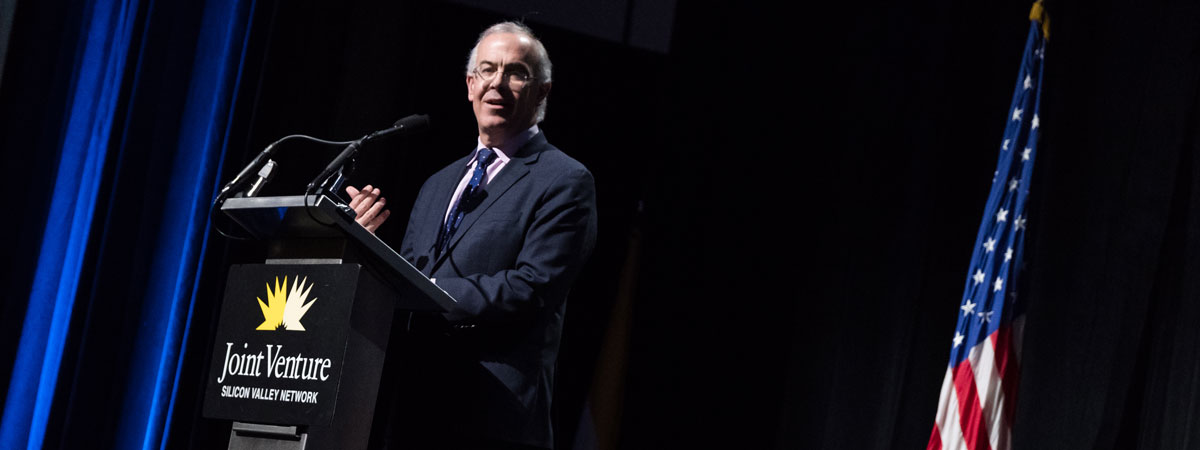Published in the January 17 – 30, 2018 issue of Morgan Hill Life

David Brooks at 2017 Joint Venture Silicon Valley “State of the Valley” address.
Photo courtesy Joint Venture Silicon Valley
Many Morgan Hill and Gilroy government and business leaders listened to New York Times columnist David Brooks speak about the state of America at Joint Venture Silicon Valley’s 2017 State of the Valley conference held at the San Jose McEnery Convention Center Feb. 17. A conservative in his political philosophy, Brooks discussed how following the 2016 election he traveled to “Trump country” to see why there is so much discord and divide among people. He talked about community building and national healing.
“When you travel around, especially in Trump areas, you notice this crisis of intimacy, a crisis of community and a crisis of solidarity. And this is pervasive across our society,” Brooks said. “One of the things when you travel across this country is that you see the collapse of social trust. A generation ago, most people said they trusted their neighbors. A majority of Americans said that. Now only 19 percent of millennials say they can trust the people around them.”
The columnist talked about the sadness and a sense of being cut off from social connections that many Americans suffer. We’re seeing a growth in isolation, with 28 percent of Americans living alone. A decline in friendship and a rise of loneliness pervades our nation, with people reporting in surveys they feel they don’t have any close friends. A reflection of this national malaise is an “epic rise in suicide” and our opioid crisis, Brooks said.
One component of the cause, he suggested, might be the digital devices that have encroached into the fabric of our lives. Technology meant for communication often cuts us off from more personal face-to-face human interaction. A study at Baylor University found that students were on their phone 10 hours a day. According to another study, the average person checks their phone 221 times a day, every three minutes, Brooks said.
“I’m beginning to think that the ubiquity of smart phones has pushed us over a threshold,” he told the audience.
Another key to understanding the crisis is the more than 10 million Americans who have given up on finding employment and spend their day in front of their television sets watching an average of 2,000 hours of shows a year to numb their minds through entertainment. Too many people are falling through the cracks in our society as our nation faces a trend toward increasing social and economic class division, Brooks said.
“You have a sense of people feeling betrayed. You have a sense of sort of a moral injury,” he said.
Despite the painful reality of economic and social decay, Brooks met people across the nation who devoted their lives to finding solutions to the challenges. They reflect the virtue of civic responsibility and commitment to our local communities — and we need more people who hold those values, he said.
We agree. One of the best ways to move away from the pain of loneliness and isolation is to team up with the many nonprofit organizations in the South Valley that strive to make the region a better place for all. The time and energy spent on helping these endeavors will be well worth it for individuals who choose to do so. We also encourage families to get their children involved in helping with civic engagement exercises. One of the best places to start is to visit the Morgan Hill History Park or the Gilroy History Museum to give the kids an understanding of how people in the past gave our communities a heritage. We hope the children also learn they have a responsibility to pass down to future generations a legacy of high quality of life.
Over the decades, America has faced many challenges to its social fabric. We celebrated Martin Luther King, Jr. Day this week, and many of us took the time to reflect on the social injustice of Jim Crow laws and voting rights violations that enforced racial segregation. It was a time of trial for America, and many of our fellow Americans — whites and blacks — took their place in the Civil Rights Movement to overcome the injustices.
As we start 2018, we still have many social challenges that await our nation and local leaders to address. As we’ve seen in the news recently, these challenges include how women, immigrants and others are often unfairly and inhumanely treated by those in power positions.
We Americans came far in the journey of self-government. The road, however, still winds ahead toward the United States becoming a better society. Let’s continue the journey as a people united by a commitment to our communities and a virtuous character.






